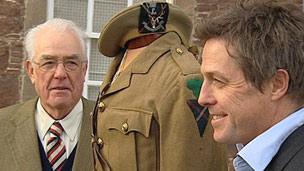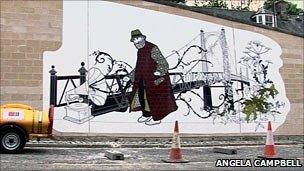Scotland's 'lost' military names
- Published

Actor Hugh Grant's father James in the Seaforth Highlanders
There has been speculation <link> <caption>military cuts</caption> <altText>Link to BBC News Scotland website</altText> <url href="http://www.bbc.co.uk/news/uk-scotland-18020870" platform="highweb"/> </link> could see the famous names of Scottish battalions - such as the Black Watch - dropped.
Here the BBC website looks at some of Scotland's "lost" martial titles of the past.
Scots soldiers played a prominent role in the British Army during the American War of Independence.
In his book, Patriot Battles, historian Michael Stephenson said: "They were to become perhaps the finest infantry in the war against America."
He said the <bold>71st Foot (Fraser's Highlanders)</bold> saw more action than any other British regiment, fighting skirmishes and in major battles.
Its soldiers fought at the battles of New York 1776, Brandywine 1777 and in 1779 at Stony Point, Briar Creek and Savannah.
Also, at Camden 1780 and Cowpens, Guildford Courthouse and Yorktown in 1781.
The <bold>Lovat Scouts (Sharpshooters) </bold>were formed by Highland laird Lord Lovat in 1916 as an element of his Lovat Scouts, which were first raised for service in the Second Boer War.
The sharpshooters were organised into nine observer groups, each made up of an officer and 20 men.
Sent to France, they operated close to enemy positions and gathered intelligence on their strength and movements.
Angus Fairrie, in his book Queen's Own Highlanders (Seaforth and Camerons): An Illustrated History, said the sharpshooters were highly valued for their skills in reconnaissance.
The historian said that after the end of World War I it was suggested an observer group should be attached to every British division.
In World War II, the <bold>Lovat Scouts</bold> were posted to defend the Faroe Islands in 1940.
While garrisoned on the north Atlantic islands, Uist-born scout Angus MacPhee took ill.
Mr MacPhee was first sent home to the Western Isles, but his family later sought medical help and he was eventually admitted as a psychiatric patient at Craig Dunain hospital in Inverness.

Lovat Scout Angus MacPhee is celebrated in a mural on Crown Road in Inverness
The former soldier, who died in 1997, said barely a word for 50 years and wove clothing and rope from grass and leaves.
Each autumn Mr MacPhee would watch as his intricate and carefully put together items were swept up in the hospital's grounds and burned along with fallen leaves.
Some of his work, including a pair of boots and a jacket, survived and he is celebrated in a mural on Crown Road in Inverness.
The rest of Lovat Scouts returned to Scotland in 1942 to guard the Royal Family during stays at Balmoral.
However, the scouts were eventually granted their wish to see action on the front line when they were sent to Italy in 1944.
In 1945, they posted to Austria to hunt fleeing Nazi and SS soldiers.
The scouts were disbanded in 1946.
The <bold>Liverpool Scottish</bold> was raised to fight in the Second Boer War in 1900 and, at first, mainly recruited Scots living in the English city.
In 1937, it became a territorial battalion of the <bold>Cameron Highlanders</bold>, based in Inverness.
Its soldiers wore the Forbes tartan and saw action during World War I. The regiment later became part of the Duke of Lancaster's Regiment.
Items connected to the Liverpool Scottish will be displayed at a revamped museum at historic Fort George, near Inverness.
Actor Hugh Grant launched the public appeal to help raise funds for the museum renovation project in November 2010.
His grandfather Col James Murray Grant, from Inverness, received the Distinguished Service Order for bravery during World War II.
The <bold>Seaforth Highlander</bold> was depot commander at Fort George after the war.
Grant's father Capt James Murray Grant also served with a Highlands regiment.
- Published10 May 2012
- Published25 August 2011
- Published4 March 2011